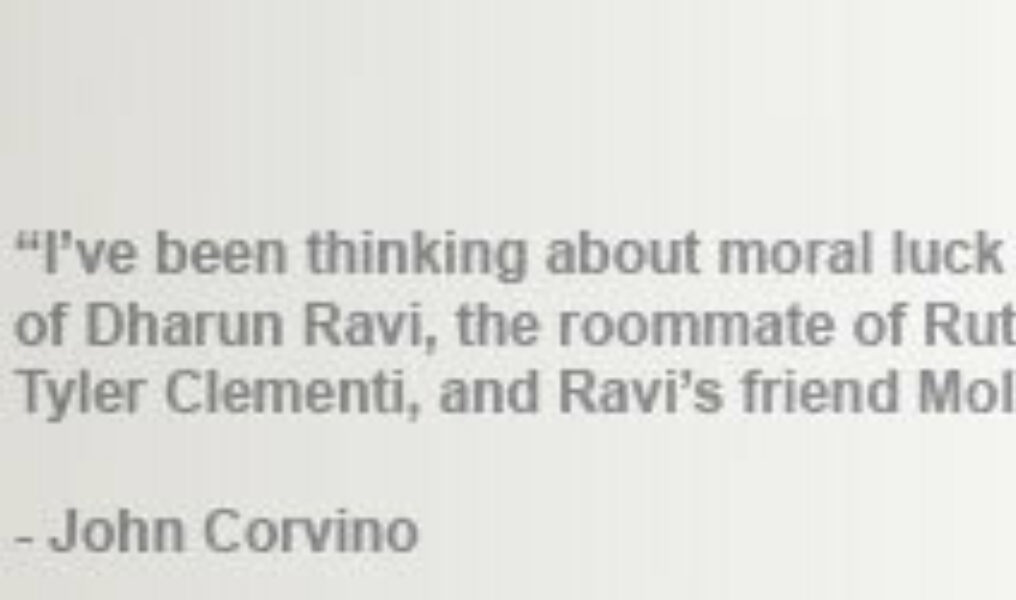by John Corvino

About 25 years ago, my sister (who was then around 10 years old) decided one day to practice cartwheels in our modestly-sized suburban living room.
Had my parents been around, they would have stopped her. They would have mildly scolded her, and she would have felt mildly guilty.
As it happened, she stopped herself – after her foot met with a perfectly scaled ceramic replica of our house displayed on our coffee table, sending it crashing to the floor. I had spent weeks creating that replica in art club after school, and when I arrived home later that day, my sister met me at the door sobbing with remorse, followed close behind by my infuriated mother.
I forgave my sister the next day, so this column is not about a 25-year grudge.
I recall the story, rather, because it nicely illustrates a concept philosophers call "moral luck": the paradox that while we think people are morally responsible only for things they control, we often morally judge people (including ourselves) for things that substantially depend on factors beyond their control. Had I not placed my art project on the coffee table, my sister would have been guilty of carelessness, but not destruction.
Or to take another, standard example: Driver A neglects to have his brakes checked, and as a result runs a stop sign (but harms no one). Driver B is exactly like Driver A, except that as he runs the stop sign he fatally strikes a child who happens to be crossing.
In terms of what they control, Driver A and Driver B do the exact same thing. But Driver B seems guilty of a greater crime (and properly feels much greater remorse).
I've been thinking about moral luck as I reflect on the case of Dharun Ravi, the roommate of Rutgers University student Tyler Clementi, and Ravi's friend Molly Wei.
As has been widely reported, Ravi and Wei secretly recorded Clementi's intimate moments with another male and broadcast them on the internet. Days later, Clementi jumped to his death from the George Washington Bridge.
Are Ravi and Wei murderers? Are they guilty (like our hypothetical Driver B) of reckless manslaughter?
Or are they simply awful pranksters, guilty of invasion of privacy (as the state is charging) but in no way responsible for Clementi's death – which involved another free agent (Clementi) and which they surely neither intended nor foresaw?
The case is complicated by several factors. Ravi and Wei are both 18, old enough to know better than to do what they did, young enough that, were it not for Clementi's suicide, few would want to see them behind bars.
Tyler Clementi was also 18, and he is now gone. Because he killed himself, one presumes that he was in a great deal of pain; because he did it days after the humiliating exposure, one presumes that Ravi's and Wei's actions strongly contributed to that pain. Thus any sympathy for them is likely to be interpreted as lack of sympathy for him.
But sympathy is not a finite resource. Nor is moral responsibility.
There is no contradiction in grieving for Tyler Clementi, while also grieving for two 18-year-olds whose bad act had far worse consequences than anyone would normally anticipate.
Yes, they fucked up. Teenagers sometimes do mean and stupid things. Luckily, such behavior rarely drives their peers to suicide.
There is also no contradiction in holding that Tyler Clementi bears responsibility for ending his life, while also holding that others (especially Ravi and Wei) bear responsibility for making that option more appealing.
Without a God's-eye view, we are ultimately in no position to judge Clementi's conscience, or Ravi's, or Wei's. The mistake, I think, is to focus all our energy on their responsibility without stopping to think about our own.
We live in a world where people are still mocked (or worse) for being lesbian, gay, bisexual, or transgender, and where some LGBT people find life so unbearable that suicide seems a reasonable option. Tragedies like these should lead each of us to ask: What have we done to contribute to such a world? To allow it? To repair it?
Are people responsible for their own actions? Yes. But the rest of us are also responsible for the pressures we put, or fail to put, on others.
The Clementi suicide and other recent tragedies invite us to reflect on our moral responsibility for creating the better world we seek. How well we achieve that world may depend partly on luck. But it also depends on our deliberate and steadfast effort to make things better.











